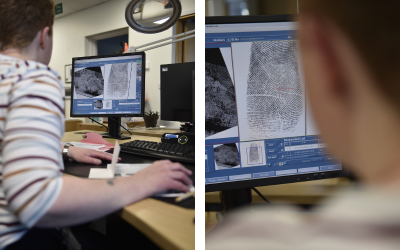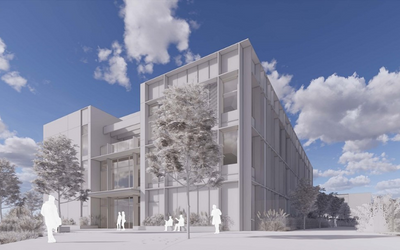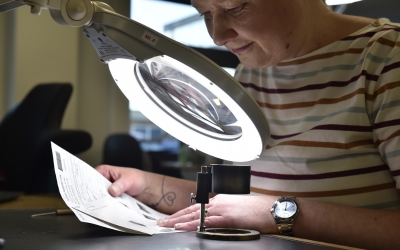Analytical Forensic Services
Analytical Forensic Services, this fascinating area of forensics, deals with the complexities of “physical” forensic evidence.
Our teams include the Fingerprint Bureau, Chemical Enhancement Laboratory, Forensic Biology Laboratory, Footwear and Toolmarks Laboratory, and Drugs Investigation Laboratory.
Highly skilled in their respective areas, staff handle, examine and process items of evidence recovered from crime scenes, victims and suspects in an attempt to establish identity or an evidential link between individuals, items and locations.
Articles requiring examination could include blood stained weapons, victims/suspect clothing, unknown substances or artefacts from a deceased person. Many team members are experts in their own right and report outcomes to court as Expert Witnesses. Some of the teams also provide scene examination services in addition to working in the lab, dealing with crime scenes, which can sometimes be unpleasant and distressing in nature.
As a highly valued member of the team, you could be utilising your expertise in conjunction with other forensic colleagues, which makes for a collaborative and exciting place to work.
Our teams are currently based at TVP Headquarters in Kidlington, however plans are afoot to move to a brand new ultramodern forensics centre in Bicester.
Check out more about each of our teams below and learn how forensic science is used to enable crime investigation from burglaries to murders.
In the pursuit of forensic excellence, find where you belong.
Analytical Forensic Services Teams
Chemical Enhancement Laboratory
If an exhibit is found at the scene of a crime that is likely to have been handled but cannot be examined by CSI using conventional fingerprint powders, it is sent to the laboratory for examination. Fingerprints can often be difficult to spot with the naked eye, it is essentially sweat left on or absorbed into a surface and so the Chemical Enhancement Laboratory have specialist chemicals, light sources and analytical equipment to make the prints more visible. Once found, the team use advanced digital photography equipment to capture the fingerprint detail in the best possible image quality.
Along with all other posts in Force Crime, Intelligence and Specialist Operations Departments, this role will require an enhanced level of vetting.

Did you know…? The lab can visualise and enhance fingerprints on a wide range of surfaces, even on evidence in cold cases over 50 years old!
Fingerprint Bureau
Once a fingerprint has been found by the Chemical Enhancement Laboratory or Crime Scene Investigator (CSI), the Fingerprint Bureau analyse, compare, search and identify samples against prints held on the National Fingerprint Database or prints provided by people who can be eliminated, for example the homeowner of a burglary. The Bureau don’t just look at fingerprints, they can also identify and compare unique detail on palm prints, the sides of your hand and even feet!
With so many different fingerprint patterns and variations to compare, an eye for detail and patience are key in this team. It takes around 3-5 years of training to become a competent fingerprint expert.


Did you know…? Each fingerprint identification is made and verified by expert individuals (not computers), and the team conduct over 15,000 fingerprint comparisons per year.
Footwear and Toolmarks Laboratory
Our team of scientists and examiners don’t just specialise in footwear marks, they also analyse marks that have been left by tools, for example those used to prise something open or to cut something.
Staff in the unit will analyse footwear marks recovered from crime scenes and compare these against impressions taken from shoes seized from suspects, looking at sole patterns, size and even how worn the sole is.
They also compare recovered footwear marks to over 40,000 different shoe marks on the national database to give detectives and officers guidance on the specific type, brand and model of footwear that offenders are likely to have been wearing.
When it comes to analysing tool marks, the team will recreate marks that a specific tool would have left and compare it to those found at the scene using microscopes.


Did you know…? TVP is the only UK Police force that have a lab that is UKAS accredited for Forensic Toolmark Comparison.
Forensic Biology Laboratory
In this lab, the team conduct intricate examinations of clothing and objects involved in crime in a controlled and sterile environment. This work often involves the use of microscopes and specialist light sources to locate the available evidence. These items can be searched for the presence of body fluids, such as blood and saliva. If found, these will be sampled and can be sent for further DNA profiling at an external forensic laboratory.
Using a variety of methods, they will also recover samples from items of clothing to test for the presence of DNA or target specific areas of an item to potentially identify who has touched or handled it. They can also recover hair and fibres from items which can also be further analysed.

Did you know…? Our team of highly trained scientists can detect and find blood as small as 0.05mm in size.
Drugs Investigation Laboratory
Our small multi-skilled team provide technical expertise, specifically for cases involving the supply of controlled drugs (County Drug Lines), co-ordinating forensic submissions to our internal and external laboratories.
They conduct and oversee forensic examinations of recovered drugs in the lab, providing accurate weights of individual drug wraps, using chemical tests and analytical equipment to identify substances.
They are also equipped to download data from mobile devices using cutting-edge technology and can process evidence for further fingerprint and DNA analysis. This is a new capability for TVP that is expanding, enabling investigations of drug supply cases and the disruption of criminal activity to be fast-tracked.

Did you know…? We can get a full identification from less than 1mg (0.001g) of drug material and have analytical equipment that can scan through clear evidence packaging to get a hit without having to open the bag.
Meet our Analytical Forensic Services colleagues
What qualifications or experience are needed in these teams?
- Whilst some roles in these specialist teams will require a degree or scientific background, others don’t, so it’s worth checking the eligibility requirements on each job description.
- Team members become adept at writing detailed analytical reports, which are often used as evidence, presented at court during the criminal justice process, so good levels of literacy and verbal communication are important.
- An analytical and enquiring mind, with logical thought processes are essential along with the ability to follow procedures, you should like routine.
- Ability to concentrate on tasks with attention to detail coupled with patience and ideally, you’ll be calm under pressure.
- We welcome good communicators who work well in a team.
Join our team – Apply today
Discover the latest Forensics opportunities at TVP on our Vacancies portal.




 Facebook
Facebook
 Twitter
Twitter
 Linkedin
Linkedin
 Instagram
Instagram